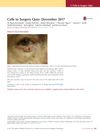 August 2017 in “Journal of epidemiological research”
August 2017 in “Journal of epidemiological research” Cancer rates are increasing in developed countries, with estrogen, aging, low vitamin D3, and HPV infection as common causes.
January 2017 in “International Journal of Trichology” Vitamin D supplements might help reduce hair fall.
[object Object]  January 2013 in “International journal of trichology”
January 2013 in “International journal of trichology” Vitamin D3 and its receptor are important for hair growth, and understanding receptors could help treat hair graying and skin cancer.
January 2012 in “Human health handbooks” The skin produces and uses vitamin D for bone health, cell growth, and immune function.
 September 2011 in “Journal der Deutschen Dermatologischen Gesellschaft”
September 2011 in “Journal der Deutschen Dermatologischen Gesellschaft” Effective treatments for scalp psoriasis include glucocorticosteroids, Vitamin D3 analogs, and combination therapies like calcipotriol and betamethasone dipropionate.
December 2009 in “Expert review of dermatology” Vitamin D may help protect against nonmelanoma skin cancer.

The vitamin D receptor has many roles in the body beyond managing calcium, affecting the immune system, hair growth, muscles, fat, bone marrow, and cancer cells.
September 2005 in “CRC Press eBooks” Vitamin D is important for skin cell growth and health, and its active form and receptor play key roles in skin and hair processes.
 July 2005 in “British Journal of Dermatology”
July 2005 in “British Journal of Dermatology” New gene mutations linked to skin conditions were found, bacteria and chemicals may worsen acne, a dog mutation could exist in humans, virus-like elements might be involved in psoriasis, and a vitamin D3 treatment doesn't prevent chemotherapy-related hair loss.
September 2021 in “Journal of advances in medicine and medical research” Low Vitamin D levels are linked to female hair loss.
May 2021 in “Indian journal of forensic medicine and toxicology” Females with androgenic alopecia have significantly lower vitamin D3 and ferritin levels.
23 citations,
October 2009 in “Gastroenterology” Vitamin D is crucial for bone health and preventing serious diseases.
 11 citations,
January 2011 in “Turkish Journal of Medical Sciences”
11 citations,
January 2011 in “Turkish Journal of Medical Sciences” Low iron levels are a significant risk factor for hair loss, while high vitamin D levels might be a response to hair loss, not a cause.
 1 citations,
June 2021 in “International Journal of Dermatology”
1 citations,
June 2021 in “International Journal of Dermatology” People with alopecia areata had lower vitamin D levels, but these levels didn't relate to many aspects of the condition.
 August 2024 in “IAHS Medical Journal”
August 2024 in “IAHS Medical Journal” Low vitamin D and ferritin levels are linked to female hair loss.
 17 citations,
April 2007 in “Kidney international”
17 citations,
April 2007 in “Kidney international” Vitamin D boosts a specific gene activity in kidney cells that could improve heart and kidney function.
 13 citations,
November 2013 in “Journal of Endocrinology/Journal of endocrinology”
13 citations,
November 2013 in “Journal of Endocrinology/Journal of endocrinology” Vitamin D receptor helps control hair growth genes in skin cells.
 2 citations,
September 2022 in “Bioscientia medicina”
2 citations,
September 2022 in “Bioscientia medicina” Topical vitamin D is effective in treating vitiligo with few side effects.
 1 citations,
November 2017 in “The journal of investigative dermatology/Journal of investigative dermatology”
1 citations,
November 2017 in “The journal of investigative dermatology/Journal of investigative dermatology” Mohs micrographic surgery is effective for treating basal cell carcinoma on the eyelid, while radiotherapy has higher recurrence rates, and topical vitamin D3 may reduce and delay BCC formation in mice.
 August 2019 in “International journal of contemporary pediatrics”
August 2019 in “International journal of contemporary pediatrics” A child with a rare type of rickets showed some improvement with high doses of vitamin D, but such conditions often respond poorly to treatment.
 August 2007 in “Journal of Investigative Dermatology”
August 2007 in “Journal of Investigative Dermatology” The meeting discussed vitamin D3's role in fighting tuberculosis, potential treatments for skin conditions like psoriasis, and hair follicle regeneration as a possible solution for hair loss.
 2 citations,
November 2017 in “PloS one”
2 citations,
November 2017 in “PloS one” Some vitamin D analogs can thicken skin and reduce pore size like a common acne treatment, with one analog also affecting skin growth factors.
51 citations,
September 2008 in “Journal of Investigative Dermatology” Vitamin D receptor may help protect against UV-induced skin cancer.
110 citations,
November 1984 in “The American Journal of Medicine” A genetic defect in vitamin D receptors causes severe rickets and hair loss in children, but some heal as they age.
 28 citations,
January 2012 in “Biological & pharmaceutical bulletin”
28 citations,
January 2012 in “Biological & pharmaceutical bulletin” Hairless protein can both repress and activate vitamin D receptor functions, affecting gene regulation.
 13 citations,
April 2018 in “Journal of The American Academy of Dermatology”
13 citations,
April 2018 in “Journal of The American Academy of Dermatology” People with certain types of hair loss, especially lichen planopilaris and telogen effluvium, as well as African Americans, Asians, and men, are more likely to have severe vitamin D deficiency.
[object Object]  11 citations,
January 2017 in “Biochemical and biophysical research communications”
11 citations,
January 2017 in “Biochemical and biophysical research communications” 1α,25-dihydroxyvitamin D3 directly affects cartilage growth and development.
 3 citations,
November 2021 in “World Journal of Clinical Pediatrics”
3 citations,
November 2021 in “World Journal of Clinical Pediatrics” Vitamin D might help treat some types of hair loss, but more research is needed.
62 citations,
January 2009 in “Biochemistry” Vitamin D receptor binds similarly to natural and synthetic ligands, affecting gene regulation.
 104 citations,
August 2008 in “Clinics in Dermatology”
104 citations,
August 2008 in “Clinics in Dermatology” Treating psoriasis on the scalp, nails, and skin folds is challenging, often requiring systemic treatments for severe cases, with some success in topical and biologic treatments.



















